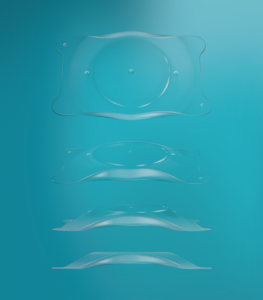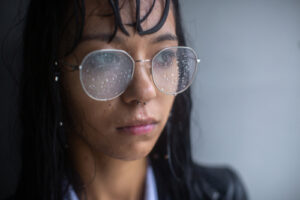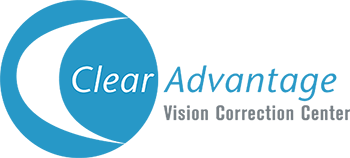Posted by: Clear Advantage in Featured, LASIK on May 26, 2023
Are you weighing your options for laser eye procedures? Selecting the right laser eye procedure to correct your vision may feel daunting.
After all, there are what feels like seemingly endless options available now. Having so many choices may make a decision feel much more challenging than necessary.
At Clear Advantage Vision Correction Center, we offer three very popular vision correction procedures, including the EVO Visian ICL, LASIK, and PRK. These procedures have unique advantages and are suited to different eye conditions and patient requirements.
Keep reading to learn more about the laser eye procedures offered at Clear Advantage Vision Correction Center and determine which one could be best for you!
EVO Visian ICL

The EVO Visian ICL is a vision correction procedure that corrects nearsightedness and astigmatism in qualifying candidates. ICL, an Implantable Collamer Lens, refers to the fact that the ICL is an additive lens placed into the eye to correct certain refractive errors.
Unlike LASIK and PRK, which alter the shape of the cornea, the EVO Visian ICL involves the placement of a biocompatible lens implant in front of the natural lens, behind the iris. The additive lens corrects refractive errors by adjusting how light focuses when it hits the retina.
Another way that the EVO Visian ICL is different from other vision correction procedures is that it’s reversible. Many patients appreciate the peace of mind this provides.
During cataract surgery, the EVO ICL can be removed from the eye or replaced with an intraocular lens. Having this level of flexibility is not available from other vision correction procedures, as they permanently alter the shape of the cornea to correct refractive errors.
The EVO Visian ICL is worth considering if you have moderate to high nearsightedness and are not considered a suitable candidate for LASIK or PRK. You may also be a good candidate for the EVO ICL if you have thin corneas or dry eyes.
LASIK

If you’re considering a vision correction procedure, LASIK is the most popular and well-known. Without a doubt, it’s the first one that people think of.
During LASIK, your surgeon will create a thin flap in the cornea with a femtosecond laser. They then lift the flap, which exposes the underlying corneal tissue.
Access to this tissue makes it possible to use a second laser, called an excimer laser, to reshape the cornea and correct any refractive errors. This ensures that light entering the eye will appropriately focus on the cornea.
When you have LASIK, you can look forward to a quick recovery time. Many patients experience improved vision almost instantly or within 24 hours of having their vision corrected.
Like any surgical procedure, LASIK has potential risks, so talk to your eye doctor to understand these before undergoing the procedure.
You may be a good candidate for LASIK if you fit certain parameters, including being at least 18 years old, have a stable prescription, have healthy eyes, and having realistic expectations about what LASIK can achieve. Remember, these are only some of the candidacy requirements for having LASIK, which is why a LASIK consultation is necessary.
PRK

Another kind of vision correction procedure is PRK. PRK produces virtually identical results to LASIK but reshapes the cornea without creating a flap.
In PRK, instead of creating a corneal flap, as in LASIK, the thin outer layer of the cornea, called the epithelium, is removed entirely. It regenerates and grows back, which can take several weeks.
The exposed corneal tissue is then reshaped using an excimer laser, which allows light to focus as it should onto the retina. Recovering after PRK takes longer because of the time it takes the epithelial cells to regenerate.
PRK is often best if you’ve been told you don’t qualify for LASIK because you have thin corneas, as no flap in the cornea is created. It’s also suitable for dry eyes or low to moderate nearsightedness.
Choosing to correct your vision will change your life. The freedom and convenience these procedures give will benefit you and improve your quality of life in ways you never imagined. Here are some reasons why people choose to correct their vision:
Visual Freedom

For most patients, the best thing about correcting their vision with a laser vision procedure is achieving visual freedom. What could be better than no longer relying on glasses or contact lenses to see the world around you?
Whether waking up in the middle of the night and seeing your clock without searching for your glasses or enjoying outdoor activities without worrying about losing or breaking contact lenses, achieving visual freedom is priceless.
Financial Savings
Although these procedures may seem expensive, remember that they are an excellent financial investment in yourself. On average, you spend at least $500 yearly on glasses, contacts, and accessories.
That adds up over the years! By correcting your vision, you’re investing in yourself and ensuring you’ll have crisp, clear vision for years to come while saving money.
Convenience in Everyday Situations

Have your glasses ever fogged up while drinking a hot cup of coffee or trying to drain a pot of pasta? Do you ever struggle with blurry vision because your glasses got wet in the rain?
These minor annoyances can become things of the past after correcting your vision. You can also say goodbye to the inconvenience of packing spare glasses or contact lenses while traveling, ensuring a stress-free experience.
Reduced Allergy Symptoms

Do you have seasonal allergies? Contact lenses often make these much worse. If your eyes are itchy or watery, it can make it much more challenging to wear contact lenses.
You may also suffer additional irritation due to your allergy symptoms. Correcting your vision can alleviate these symptoms and make allergy season more bearable.
Are you ready to find out which vision correction procedure could be right for you? Take the next step by scheduling a consultation at Clear Advantage Vision Correction Center in Portsmouth, NH! Haven’t you waited long enough to have better vision?






